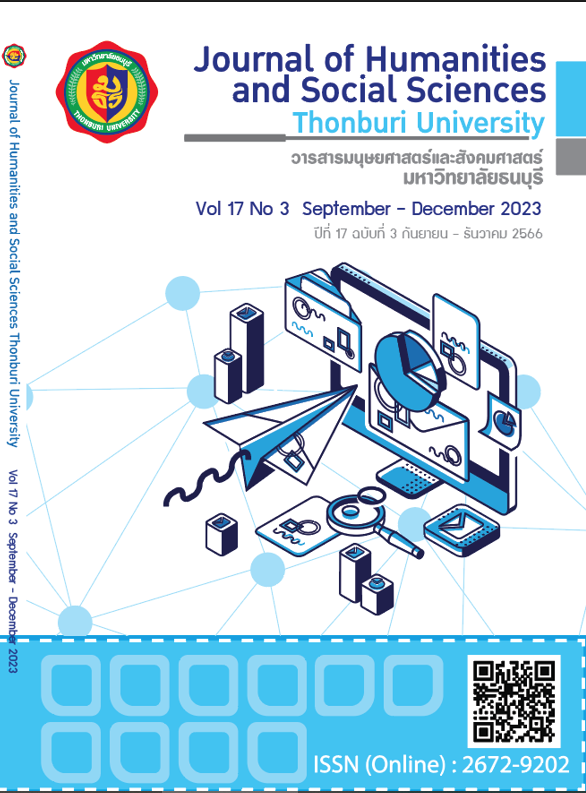การพัฒนารูปแบบการบริหารงานวิชาการ โดยบูรณาการแนวคิดจิตตปัญญาศึกษาและ วงจรบริหารงานคุณภาพในสถานศึกษาอาชีวศึกษา
คำสำคัญ:
การบริหารงานวิชาการ, หลักสูตรฝึกอบรม, จิตตปัญญาศึกษา, วงจรบริหารงานคุณภาพบทคัดย่อ
การวิจัยนี้มีวัตถุประสงค์เพื่อ 1) พัฒนาและประเมินความเหมาะสมของรูปแบบการบริหารงานวิชาการโดยบูรณาการแนวคิดจิตตปัญญาศึกษาและวงจรบริหารงานคุณภาพในสถานศึกษาอาชีวศึกษา และ 2) พัฒนาและประเมินหลักสูตรฝึกอบรมการบริหารงานวิชาการโดยบูรณาการแนวคิดจิตตปัญญาศึกษาและวงจรบริหารงานคุณภาพในสถานศึกษาอาชีวศึกษา กลุ่มตัวอย่าง จำนวน 314 คน วิเคราะห์ข้อมูลโดยใช้สถิติ ค่าร้อยละ ค่าเฉลี่ย ส่วนเบี่ยงเบนมาตรฐาน และจัดลำดับความสำคัญของความต้องการจำเป็น ผลการวิจัยพบว่า 1) รูปแบบ ประกอบด้วย 4 ระยะ คือ ระยะที่ 1 ขั้นวางแผนเตรียมความพร้อมการบริหารงานวิชาการ ระยะที่ 2 ขั้นดำเนินการบริหารงานวิชาการโดยบูรณาการแนวคิดจิตตปัญญาศึกษาและวงจรบริหารงานคุณภาพ ระยะที่ 3 ขั้นตรวจสอบการบริหารงานวิชาการ และระยะที่ 4 ขั้นการปรับปรุงการบริหารงานวิชาการ ผลการประเมินรูปแบบ ในภาพรวมอยู่ในระดับมาก และ 2) ผลการจัดลำดับความสำคัญของความต้องการจำเป็นอยู่ระหว่าง 0.71 ถึง 0.60 หลักสูตรฝึกอบรมที่พัฒนาขึ้น ประกอบด้วย 3 หน่วย ได้แก่ 1) การบริหารงานคุณภาพ PDCA 2) การวิเคราะห์งานการบริหารงานวิชาการในสถานศึกษาอาชีวศึกษา และ 3) จิตตปัญญาศึกษา การประเมินหลักสูตรฝึกอบรมโดยใช้รูปแบบซิปป์ พบว่า การประเมินบริบทและปัจจัยเบื้องต้นมีความสอดคล้องกันทุกรายการประเมิน การประเมินกระบวนการได้คะแนนเฉลี่ยภาคทฤษฎี 85.37/83.60 และภาคปฏิบัติ 81.05 ความพึงพอใจในภาพรวมอยู่ในระดับมากที่สุด และการประเมินผลผลิต ในภาพรวมอยู่ในระดับมากที่สุด
เอกสารอ้างอิง
กระทรวงศึกษาธิการ. (2564). ประกาศกระทรวงศึกษาธิการ เรื่อง นโยบายและจุดเน้นของกระทรวงศึกษาธิการประจำปีงบประมาณ พ.ศ. 2565. สืบค้นเมื่อ 7 มกราคม 2565, จาก https://moe360.blog/2022/01/19/policy-and-focus-moe
กิ่งก้าน ชนนิ์ชนก กิ่งก้าน กรองทิพย์ นาควิเชตร และกฤษฎา วัฒนศักดิ์. (2564). ศึกษาปัญหาการบริหารงานวิชาการและแนวทางการพัฒนาของสถานศึกษาที่มีนักเรียนต่างด้าว สังกัดสำนักงานเขตพื้นที่การศึกษาประถมศึกษานครราชสีมา เขต 4. การประชุมวิชาการระดับชาติ วิทยาลัยนครราชสีมา ครั้งที่ 8 (ภาคโปสเตอร์): 140-152.
จรวยพร แดงโชติ. (2558). การประยุกต์ใช้กระบวนการจิตตปัญญาศึกษาและเครือข่ายสังคมออนไลน์ในการส่งเสริมความรู้และทักษะด้านพัฒนาการเด็กปฐมวัย สำหรับผู้ปกครองนักเรียนโรงเรียนอนุบาลเอกชนในจังหวัดนนทบุรี. ศึกษาศาสตรดุษฏีบัณฑิต, มหาวิทยาลัยธุรกิจบัณฑิต.
เจษฎาภรณ์ สายถิ่น. (2553). ผลการใช้กระบวนการเรียนรู้แบบมีส่วนร่วมที่มีต่อการปรับเปลี่ยนพฤติกรรมการติดเกม คอมพิวเตอร์ของนักเรียนระดับประถมศึกษาโรงเรียนสันติศึกษา อำเภอเมือง จังหวัดเชียงใหม่. ศึกษาศาสตรมหาบัณฑิต, มหาวิทยาลัยเชียงใหม่.
ชลลดา ทองทวี และคณะ. (2551). รายงานผลการดําเนินงานฉบับสมบูรณ โครงการวิจัยและจัดการความรู้จิตตปัญญาศึกษา. นครปฐม: สำนักงานกองทุนสนับสนุนการสร้างเสริมคุณภาพและศูนย์จิตตปัญญาศึกษา มหาวิทยาลัยมหิดล.
ณพสร สวัสดิบุญญา. (2553). รูปแบบการฝึกอบรมหัวหน้าแผนกวิชาเพื่อพัฒนาหลักสูตรฝึกอบรมการเรียนรู้โดยใช้ปัญหาเป็นฐานในการจัดการเรียนการสอน. ปรัชญาดุษฎีบัณฑิต, มหาวิทยาลัยเทคโนโลยีพระจอมเกล้าพระนครเหนือ.
ณรงค์กร ชัยวงศ์. (2563). รูปแบบการบริหารงานวิชาการของคณะพยาบาลศาสตร์ มหาวิทยาลัยราชภัฏ. ปรัชญาดุษฎีบัณฑิต, มหาวิทยาลัยราชภัฏบุรีรัมย์.
ทัศนีย์ นาคุณทรง. (2552). การพัฒนาหลักสูตรฝึกอบรมวิทยากรเพื่อพัฒนาบุคลากรศูนย์พัฒนาเด็กเล็กองค์การบริหารส่วนตำบล. ปรัชญาดุษฎีบัณฑิต, มหาวิทยาลัยเทคโนโลยีพระจอมเกล้าพระนครเหนือ.
นลินี ณ นคร รักธรรม. (2563). นวัตกรรมการจัดการของมหาวิทยาลัยเอกชนด้านธุรกิจการบินยุคประชาคมอาเซียน.วารสารวิจัยราชภัฏกรุงเก่า. 7(2): 17-24.
บุญชม ศรีสะอาด. (2554). การวิจัยทางการวัดผลและประเมินผล. พิมพ์ครั้งที่ 9. กรุงเทพฯ: สุวีริยาสาส์น.
ประเวศ วะสี. (2550). วิถีมนุษย์ในศตวรรษที่ 21: ศูนย์ หนึ่ง เก้า. พิมพ์ครั้งที่ 4. กรุงเทพฯ: โครงการหนังสือวิชาการจิตตปัญญา.
ปริษฐา ถนอมเวช. (2563). การพัฒนาหลักสูตรฝึกอบรมงานพิมพ์หนังสือราชการภายในของครูโดยใช้รูปแบบซิป. วารสารครุศาสตรอุตสาหกรรม, 19(2): 12-19.
ปรียาพร วงศ์อนุตรโรจน์. (2553). การบริหารงานวิชาการ. พิมพ์ครั้งที่ 10. กรุงเทพฯ: ศูนย์สื่อเสริมกรุงเทพ.
พิสิฐ เมธาภัทร และคณะ. (2532). ยุทธวิธีการเรียนการสอนวิชาเทคนิค. กรุงเทพฯ: โรงพิมพ์มหาวิทยาลัยเทคโนโลยีพระจอมเกล้าพระนครเหนือ.
วราภรณ์ ศรีจันทร์พาล. การพัฒนารูปแบบการบริหารงานวิชาการเพื่อเสริมสร้างคุณลักษณะที่พึงประสงค์ของนักศึกษา พยาบาลในศตวรรษที่ 21 สถาบันพระบรมราชชนก. การศึกษาดุษฎีบัณฑิต, มหาวิทยาลัยพะเยา.
วิจักขณ์ พานิช. (2549). การเรียนรู้ด้วยใจอย่างใคร่ครวญ เอกสารประกอบการประชุมวิชาการระดับชาติเพื่อการพัฒนา บัณฑิตอุดมคติไทย ครั้งที่ 6. กรุงเทพฯ: สำนักงานคณะกรรมการอุดมศึกษา.
วิภาภรณ์ สร้อยคำ. (2561). การพัฒนารูปแบบการบริหารงานวิชาการที่มีประสิทธิผลของโรงเรียนเอกชนสังกัดสำนักงานเขตพื้นที่การศึกษาประถมศึกษาในจังหวัดสกลนคร. ครุศาสตรมหาบัณฑิต, มหาวิทยาลัยราชภัฏสกลนคร.
วีรินท์ พรหมวงศ์. (2557). การใช้หลักสูตรฝึกอบรม: การพัฒนาศักยภาพอาชีวอนามัยในชุมชนโดยเน้นกระบวนการเรียนรู้แบบมีส่วนร่วม. ครุศาสตร์มหาบัณฑิต, มหาวิทยาลัยราชภัฏเชียงใหม่.
ศิริชัย กาญจนวาสี. (2554). ทฤษฎีการประเมิน. พิมพ์ครั้งที่ 8. กรุงเทพฯ: โรงพิมพ์แห่งจุฬาลงกรณ์มหาวิทยาลัย.
สงัด อุทรานันท์. (2530). ทฤษฎีหลักสูตร. กรุงเทพฯ: โรงพิมพ์สยาม.
สำนักงานคณะกรรมการการอาชีวศึกษา. (2563). ข้อมูลสถานศึกษาอาชีวศึกษาภาคเอกชน. สืบค้นเมื่อ 9 สิงหาคม 2563, จาก http://techno.vec.go.th/Default.aspx?tabid=659
สุวิมล ว่องวาณิช. (2550). การวิจัยประเมินความต้องการจำเป็น. กรุงเทพฯ: จุฬาลงกรณ์มหาวิทยาลัย.
โสภณ มโนมะยา. (2562). รูปแบบการพัฒนาครูด้วยแนวคิดจิตตปัญญาศึกษา. ปรัชญาดุษฎีบัณฑิต, มหาวิทยาลัยรามคำแหง.
Cochran. W. G. (1997). Sampling techniques. Hoboken, NJ: John Wiley & Sons, Inc.
Deming, W.E. (1982). Quality, Productivity and Competitive Position. Cambridge: Center for Advance Engineering, Massachusetts Institute of Technology.
Krejcie, R. V. & Morgan, D. W. (1970). Determining Sample Size for Research Activities. Educational and Psychological Measurement, 30(3): 607-610.
Likert, R. (1967). A Technique for the Measurement of Attitude. Chicago: Rand me Nally Company.
Stufflebeam, Daniel L. et.al. (1971). Educational Evaluation and Decision Making. Itasca, Illinois: Peacock Publisher Inc.
Taba, Hilda. (1962). Curriculum Development: Theory and Practice. New York: Harcourt, Brance, n.d.
Tyler Raph, W. (1975). Basic Principles of Curriculum and Instruction. Chicago: University of Chicago Press.
Translated Thai References
Chanchanok, K., Nakwichet, K. and Wattanasak, K. (2021). Problems and Guidelines for Academic Administration Development of Schools with Foreign Students under the Jurisdiction of Nakhon Ratchasima Primary Educational Service Area Office 4. The 8th National Conference Nakhon Ratchasima (Poster): 140-152. (in Thai)
Chiwong, N. (2020). The Model of Academic Administration of the Faculty of Nursing, Rajabhat University. Doctor of philosophic, Buriram Rajabhat University. (in Thai)
Dangchot Jarouyporn. An application of contemplative education process and social media network for enriching knowledge and skills needed for parents on child development of private kindergarten in Nonthaburi province. Doctor of Education, Dhurakij Pundit University. (in Thai)
Kanjanawasri, S. (2011). Evaluation Theory. 8th ed. Bangkok: Chulalongkorn University Press. (in Thai)
Manomaya, S. (2019). A Teacher Development Model Based on Contemplative Education. Doctor of philosophic, Ramkhamhaeng University. (in Thai)
Methapatara, P. et al. (1989). Didactic for Technical Course. Bangkok: Faculty of Technical Education, King Mongkut’s University of Technology North Bangkok Press. (in Thai)
Ministry of Education. (2021). Announcement of the Ministry of Education on Policies and Emphasis of the Ministry of Education Fiscal Year 2022. Retrieved January 7, 2022, from https://moe360.blog/2022/01/ 19/policy-and-focus-moe (in Thai)
Na Nakorn Raktham, N. (2020). Management Innovation of Private University for Airline Business Education in ASEAN Community. ARU Research Journal. 7(2): 17-24. (in Thai)
Nakunsong, T. (2009). The Development of Training Curriculum for Trainers to Develop the Personnel of Early Childhood Development Center in Sub-District Administration Organizations. Doctor of Philosophy, King Mongkut’s University of Technology North Bangkok. (in Thai)
Office of the Vocational Education Commission. (2019). Private vocational education institutions. Retrieved March 3, 2019, from http://techno.vec.go.th/Default.aspx?tabid=659 (in Thai)
Panich, V. (2006). Learning by heart through thought. Supporting documents for the National Academic Conference for Development The 6th Ideal Thai Graduate. Bangkok: Office of the Higher Education Commission. (in Thai)
Promwong V. (2014). Use of Curriculum : The Development of Occupational Health in Community focusing on Participatory Learning Process. Master of Education, Chiang Mai Rajabhat University. (in Thai)
Saithin, J. (2010). Effects of Using Participatory Learning Process on Behavioral Modification of Addiction to Computer Games of Primary school Students, Santhi Suksa School, Mueang District, Chiang Mai Province. Master of Education Thesis, Chiang Mai University. (in Thai)
Soykam, W. (2018). The Development of Effective Academic Affairs Administration Model for Private Schools under the Primary Educational Service Area Offices in Sakon Nakhon Province. Master of Education, Sakon Nakhon Rajabhat University. (in Thai)
Srijanpal, W. (2022). The Development of Academic Administration Model to Support the Desirable Characteristic of Nursing Students in the 21st Century Praboromarajchanok Institute. Doctor of Education, Phayao University. (in Thai)
Srisaard, B. (2011). Measurement and Evaluation Research. 9th ed. Bangkok: Suwiriyasan. (in Thai)
Swaddiboonya, N. (2010). Training model for the head of department to develop training programs on problem-based learning instruction. Doctor of philosophic, King Mongkut’s University of Technology North Bangkok. (in Thai)
Thanomvech Paristha. (2020). Evaluation of the Training Program on Internal Official Correspondence for Teachers Using CIPP Model. Journal of Industrial Education. 19(2): 12-19. (in Thai)
Thongthavee, C.; et al.. (2008). Report on the complete performance. Cognitive Education Research and Management Project. Nakhon Pathom: Office of the Quality Promotion Foundation and Contemplative Education Institute Mahidol University. (in Thai)
Utranun, S. (1987). Curriculum theory. Bangkok: Mit Siam Printing. (in Thai)
Wasi, P. (2007). Human Ways in the 21st Century: Zero, One, Nine. 4thed. Bangkok: Book Project Academic Mental Intelligence. (in Thai)
Wonganutaroj, P. (2010). Academic administration. 10thed. Bangkok: Bangkok Media Center. (in Thai)
Wongwanich, S. (2007). New Methods of Assessment of Learning. Bangkok: Chulalongkorn University Press. (in Thai)
ดาวน์โหลด
เผยแพร่แล้ว
รูปแบบการอ้างอิง
ฉบับ
ประเภทบทความ
สัญญาอนุญาต
ลิขสิทธิ์ (c) 2023 jidapa Chusung

อนุญาตภายใต้เงื่อนไข Creative Commons Attribution-NonCommercial-NoDerivatives 4.0 International License.
ผลงานที่ปรากฎในวารสารฉบับนี้เป็นลิขสิทธิ์เฉพาะส่วนบุคคลของผู้เขียนซึ่งต้องรับผิดชอบต่อผลทาง กฎหมายที่อาจเกิดขึ้นได้และไม่มีผลต่อกองบรรณาธิการ






